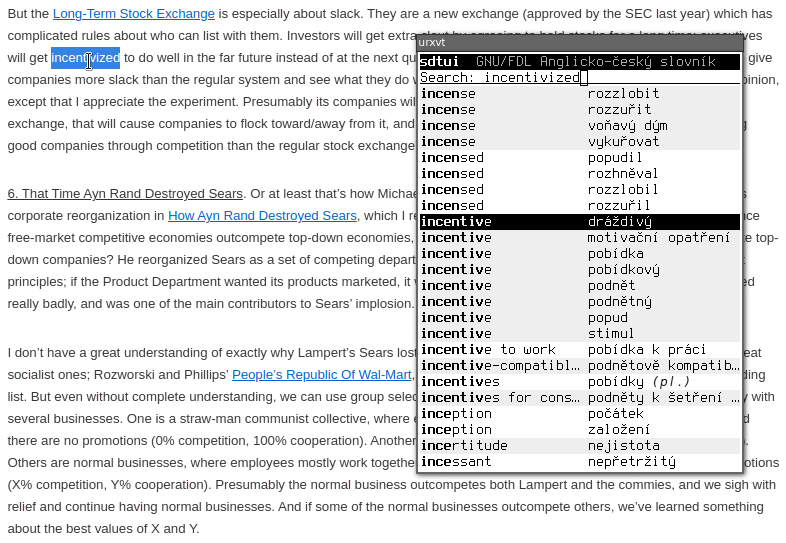Translation dictionary viewer
tdv aims to provide an easy way of viewing translation as well as other kinds of StarDict dictionaries, and is inspired by the dictionary component of PC Translator. I was unsuccessful in finding any free software of this kind, and thus decided to write my own.
The project is covered by a permissive license, unlike vast majority of other similar projects, and can serve as a base for implementing other dictionary software.
As a recent addition, the program also offers a GTK+ 3 based user interface, whose styling will follow your theme, and may be customized from gtk.css.
Packages
Regular releases are sporadic. git master should be stable enough. You can get a package with the latest development version using Arch Linux’s AUR, or as a Nix derivation.
Documentation
See the man page for information about usage. The rest of this README will concern itself with externalities.
Building and Running
Build-only dependencies:
CMake, pkg-config, gettext utilities, asciidoctor or asciidoc
Optional build-only dependencies:
librsvg (for the GUI), icoutils (for the GUI, when targetting Windows)
Runtime dependencies:
ncursesw, zlib, ICU, termo (included), glib-2.0 >= 2.38, pango
Optional runtime dependencies:
xcb, xcb-xfixes (the first two for the TUI), gtk+-3.0 (for the GUI)
$ git clone --recursive https://git.janouch.name/p/tdv.git $ mkdir tdv/build $ cd tdv/build $ cmake .. -DCMAKE_INSTALL_PREFIX=/usr -DCMAKE_BUILD_TYPE=Debug \ -DWITH_X11=ON -DWITH_GUI=ON $ make
To install the application, you can do either the usual:
# make install
Or you can try telling CMake to make a package for you. For Debian it is:
$ cpack -G DEB # dpkg -i tdv-*.deb
Having the program installed, simply run it with a StarDict .ifo file as an argument. It is, however, preferable to configure it to load your dictionaries automatically.
Windows
With the help of Mingw-w64 and WINE, tdv will successfully cross-compile for Windows. It isn’t particularly usable on that system, if only because selection watching is a very X11/Wayland-specific feature. Beware that build dependencies take up almost a gigabyte of disk space.
$ sh -e cmake/Win64Depends.sh $ cmake -DCMAKE_TOOLCHAIN_FILE=cmake/Win64CrossToolchain.cmake \ -DCMAKE_BUILD_TYPE=Release -B build $ cmake --build build — package
Dictionaries
This application is intended for use with specific dictionaries: each line should contain one short word definition. Moreover, the only supported content types are plain text, Pango markup, and XDXF (the visual format works better).
The make dicts command will build some examples from freely available sources:
-
GNU/FDL Czech-English dictionary
-
Czech foreign words (the site’s export is broken as of 2022/08, no response)
-
Czech WordNet 1.9 PDT (synonyms, hypernyms, hyponyms)
You can use the included tdv-transform tool to convert already existing
StarDict dictionaries that are nearly good as they are. Remember that you can
change the sametypesequence of the resulting .ifo file to another format,
or run dictzip on .dict files to make them compact.
Further Development
While I’ve been successfully using tdv for many years now, some issues should be addressed before including the software in regular Linux and/or BSD distributions:
-
The GUI is awkward to configure.
-
Lacking configuration, standard StarDict locations should be scanned.
Given all issues with the file format, it might be better to start anew.
Contributing and Support
Use https://git.janouch.name/p/tdv to report any bugs, request features,
or submit pull requests. git send-email is tolerated. If you want to discuss
the project, feel free to join me at ircs://irc.janouch.name, channel #dev.
Bitcoin donations are accepted at: 12r5uEWEgcHC46xd64tt3hHt9EUvYYDHe9
License
This software is released under the terms of the 0BSD license, the text of which is included within the package along with the list of authors.
